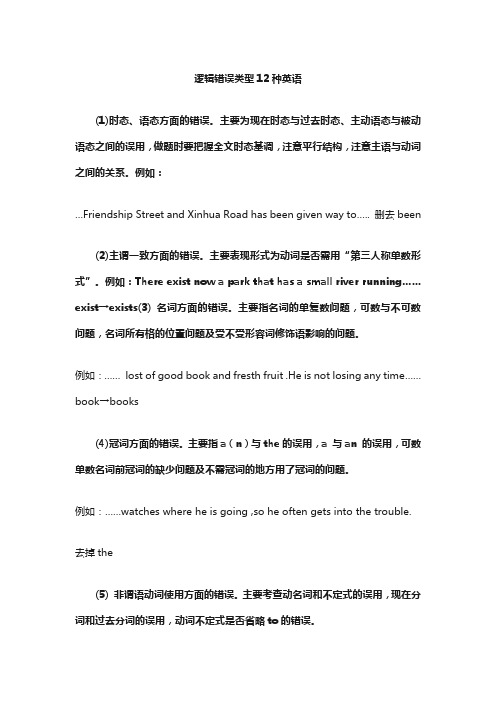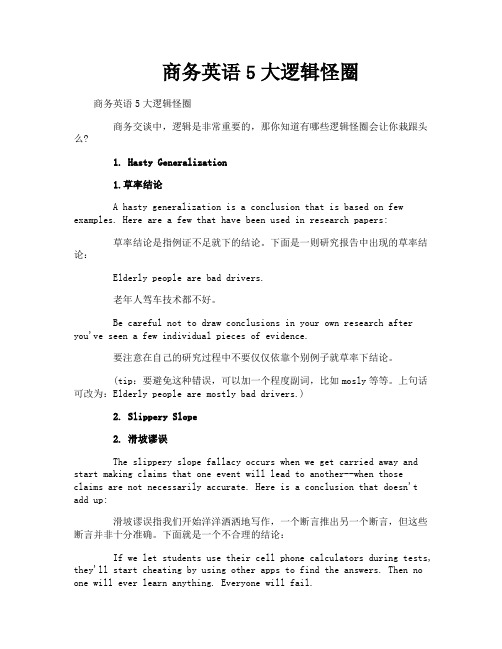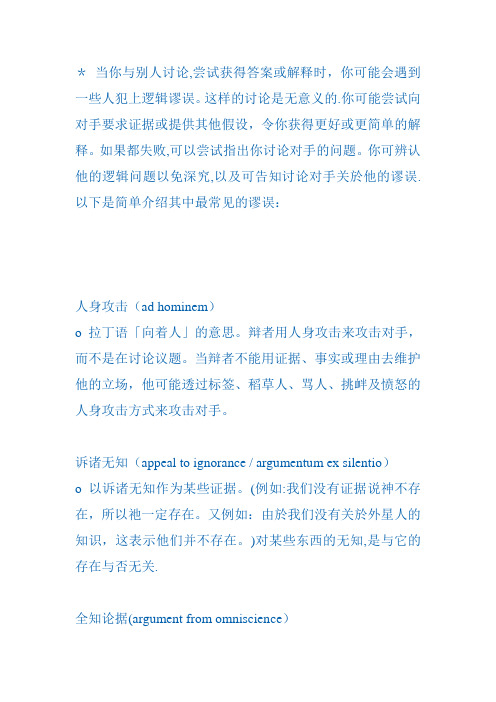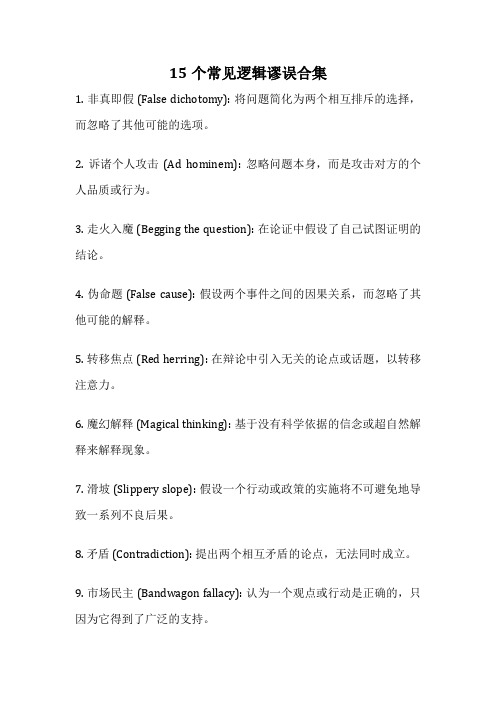英语专业必备 常见逻辑谬误
逻辑错误类型12种英语

逻辑错误类型12种英语(1)时态、语态方面的错误。
主要为现在时态与过去时态、主动语态与被动语态之间的误用,做题时要把握全文时态基调,注意平行结构,注意主语与动词之间的关系。
例如:…Friendship Street and Xinhua Road has been given way to….. 删去been(2)主谓一致方面的错误。
主要表现形式为动词是否需用“第三人称单数形式”。
例如:There exist now a park that has a small river running……exist→exists(3) 名词方面的错误。
主要指名词的单复数问题,可数与不可数问题,名词所有格的位置问题及受不受形容词修饰语影响的问题。
例如:……lost of good book and fresth fruit .He is not losing any time……book→books(4)冠词方面的错误。
主要指a(n)与the的误用,a 与an 的误用,可数单数名词前冠词的缺少问题及不需冠词的地方用了冠词的问题。
例如:……watches where he is going ,so he often gets into the trouble.去掉the(5) 非谓语动词使用方面的错误。
主要考查动名词和不定式的误用,现在分词和过去分词的误用,动词不定式是否省略to的错误。
例如…from school because he is busy study what he has ……. study→studying(6)连词方面的错误。
主要表现为“and, so, or,but ”之间,“while 与when”,“however与therefore”之间的误用。
此种错误所占比例较大。
例如:Some friends of his go to see him every day , ∧they take him ……they 前加and(7)形容词、副词方面的错误。
逻辑谬误英文作文

逻辑谬误英文作文英文:Logical fallacies are errors in reasoning that can lead to false conclusions. There are many different types of logical fallacies, but some of the most common include ad hominem attacks, straw man arguments, and slippery slope arguments.Ad hominem attacks involve attacking the person making an argument rather than addressing the argument itself. For example, if someone says that we need to take action to address climate change, and someone else responds by saying that the first person is just a tree-hugging hippie who hates capitalism, that is an ad hominem attack.Straw man arguments involve misrepresenting the other person's argument in order to make it easier to attack. For example, if someone says that we need to raise taxes on the wealthy in order to fund social programs, and someone elseresponds by saying that the first person wants to take all the money from the rich and give it to lazy people whodon't want to work, that is a straw man argument.Slippery slope arguments involve suggesting that if we take one action, it will inevitably lead to a series of negative consequences. For example, if someone says that we should legalize marijuana, and someone else responds by saying that if we do that, it will lead to a society where everyone is constantly high and nothing gets done, that isa slippery slope argument.中文:逻辑谬误是推理中可能导致错误结论的错误。
商务英语5大逻辑怪圈

商务英语5大逻辑怪圈商务英语5大逻辑怪圈商务交谈中,逻辑是非常重要的,那你知道有哪些逻辑怪圈会让你栽跟头么?1. Hasty Generalization1.草率结论A hasty generalization is a conclusion that is based on few examples. Here are a few that have been used in research papers:草率结论是指例证不足就下的结论。
下面是一则研究报告中出现的草率结论:Elderly people are bad drivers.老年人驾车技术都不好。
Be careful not to draw conclusions in your own research afteryou've seen a few individual pieces of evidence.要注意在自己的研究过程中不要仅仅依靠个别例子就草率下结论。
(tip:要避免这种错误,可以加一个程度副词,比如mosly等等。
上句话可改为:Elderly people are mostly bad drivers.)2. Slippery Slope2. 滑坡谬误The slippery slope fallacy occurs when we get carried away and start making claims that one event will lead to another--when those claims are not necessarily accurate. Here is a conclusion that doesn't add up:滑坡谬误指我们开始洋洋洒洒地写作,一个断言推出另一个断言,但这些断言并非十分准确。
下面就是一个不合理的结论:If we let students use their cell phone calculators during tests, they'll start cheating by using other apps to find the answers. Then no one will ever learn anything. Everyone will fail.如果我们让学生在考试中使用手机上的计算器,他们就会用其他的.手机应用找答案作弊。
逻辑错误大全

*当你与别人讨论,尝试获得答案或解释时,你可能会遇到一些人犯上逻辑谬误。
这样的讨论是无意义的.你可能尝试向对手要求证据或提供其他假设,令你获得更好或更简单的解释。
如果都失败,可以尝试指出你讨论对手的问题。
你可辨认他的逻辑问题以免深究,以及可告知讨论对手关於他的谬误.以下是简单介绍其中最常见的谬误:人身攻击(ad hominem)o 拉丁语「向着人」的意思。
辩者用人身攻击来攻击对手,而不是在讨论议题。
当辩者不能用证据、事实或理由去维护他的立场,他可能透过标签、稻草人、骂人、挑衅及愤怒的人身攻击方式来攻击对手。
诉诸无知(appeal to ignorance / argumentum ex silentio)o 以诉诸无知作为某些证据。
(例如:我们没有证据说神不存在,所以祂一定存在。
又例如:由於我们没有关於外星人的知识,这表示他们并不存在。
)对某些东西的无知,是与它的存在与否无关.全知论据(argument from omniscience)o (例如:所有人都相信某些东西,每个人都知道的。
)辩者需要有全知能力以清楚每个人的信仰、怀疑或他们的知识。
小心如「所有」、「每个人」、「每种东西」、「绝对」等词语。
诉诸信心(appeal to faith)(例如:如果你不相信,是不能清楚明白的。
)如果辩者倚仗信心作为他论据的根基,那麽你在以後的讨论所能得到的将不多。
根据定义,「信心」是倚靠相信,并非靠逻辑或证据支持。
信心倚赖非理性的思想,并会产生不妥协.诉诸传统(appeal to tradition)(类似主流思想谬误)(例如:占星、宗教、奴隶)只因为人们以此为传统,与它本身的存活能力无关。
诉诸权威(argument from authority / argumentum ad verecundiam)*以「专家」或权威的说话作论据的根基,而不是用逻辑或证据来支持该论据。
(例如:某某教授相信创造科学。
)只由於某个权威的声称,不足以代表他已令这声称正确。
英语作文逻辑谬误分析

英语作文逻辑谬误分析In analyzing logical fallacies in English essays, it's crucial to understand the common types of errors that can occur. Logical fallacies are flaws in reasoning that weaken the overall argument. Here, I'll discuss several prevalent fallacies and provide examples to illustrate each one.1. Ad Hominem: This fallacy involves attacking the person making the argument rather than addressing the argument itself.Example: "John's proposal for healthcare reformshouldn't be taken seriously because he's a known criminal."2. Straw Man: This occurs when someone misrepresents their opponent's argument to make it easier to attack.Example: "Opponents of stricter gun control laws want to arm everyone, turning our streets into warzones."3. Appeal to Authority: This involves using anauthority figure's opinion as evidence in an argument when the authority is not truly an expert on the subject.Example: "Dr. Smith, a renowned physicist, believes in the existence of ghosts, so they must be real."4. False Dichotomy: This occurs when only two options are presented as if they are the only possibilities when,in fact, there are more.Example: "Either we cut social programs entirely, or our country will go bankrupt."5. Circular Reasoning: This happens when the conclusion is simply restated in different terms as evidence to support the conclusion.Example: "The Bible is true because it is the word of God, and we know this because the Bible says so."6. Appeal to Emotion: This involves manipulating emotions to distract from the facts of the argument.Example: "Supporting this environmental policy is the only compassionate choice for caring individuals."7. Hasty Generalization: This occurs when a conclusionis drawn from insufficient evidence.Example: "I met one rude person from France, so all French people must be rude."8. Appeal to Ignorance: This fallacy asserts that a proposition is true because it has not been proven false,or vice versa.Example: "Aliens must exist because no one has proven they don't."9. Begging the Question: This happens when the conclusion of an argument is assumed in one of the premises.Example: "The death penalty is wrong because it is morally unacceptable to execute people."10. Post Hoc Ergo Propter Hoc: This fallacy assertsthat because one event follows another, the first event must have caused the second.Example: "Every time I wear my lucky socks, my team wins. Therefore, my lucky socks must be the reason for our victories."In English essays, it's important to identify and avoid these logical fallacies to strengthen the argument's credibility and persuasiveness. By recognizing these errors in reasoning, writers can construct more robust and compelling arguments.。
15个常见逻辑谬误合集

15个常见逻辑谬误合集1. 非真即假 (False dichotomy): 将问题简化为两个相互排斥的选择,而忽略了其他可能的选项。
2. 诉诸个人攻击(Ad hominem): 忽略问题本身,而是攻击对方的个人品质或行为。
3. 走火入魔 (Begging the question): 在论证中假设了自己试图证明的结论。
4. 伪命题 (False cause): 假设两个事件之间的因果关系,而忽略了其他可能的解释。
5. 转移焦点 (Red herring): 在辩论中引入无关的论点或话题,以转移注意力。
6. 魔幻解释 (Magical thinking): 基于没有科学依据的信念或超自然解释来解释现象。
7. 滑坡 (Slippery slope): 假设一个行动或政策的实施将不可避免地导致一系列不良后果。
8. 矛盾 (Contradiction): 提出两个相互矛盾的论点,无法同时成立。
9. 市场民主 (Bandwagon fallacy): 认为一个观点或行动是正确的,只因为它得到了广泛的支持。
10. 隐含假设 (Hidden assumption): 在论证中使用了未明确表达的假设。
11. 沉没成本(Sunk cost fallacy): 基于已经投入的资源或努力来决定未来的行动,而忽略了其他因素。
12. 先例偏见(Appeal to tradition): 认为某个观点或做法是正确的,只因为它已经存在了很长时间。
13. 无中生有 (Non sequitur): 提出一个与前提无关的结论。
14. 自相矛盾 (Self-contradiction): 在同一论证中提出两个相互矛盾的论点。
15. 集体傲慢 (Appeal to authority): 认为某个观点是正确的,只因为它来自于一个权威人士或专家。
常见谬误
雅思写作:了解基本逻辑,避免常见错误2010-05-29 10:37:37 Tag:学英语英语学习资料资料下载我要评论()雅思写作:了解基本逻辑,避免常见错误(一)了解基本逻辑,避免常见错误要了解基本逻辑错误一定不能错过一篇英文小品文Love Is A Fallacy(作者Max Shulman),这里仅列举出十种最常见的逻辑错误。
1.草率前提(Dicto Simpliciter) (一)了解基本逻辑,避免常见错误要了解基本逻辑错误一定不能错过一篇英文小品文Love Is A Fallacy(作者Max Shulman),这里仅列举出十种最常见的逻辑错误。
1.草率前提(Dicto Simpliciter)例如:Women are on average not as strong as men and less able to perform well politically. Therefore, women can't pull their weight in government work.点评:虽然女性确实在政界担任较少工作,但这不意味着女性群体中所有的人都是这样。
2.过度概化(Hasty Generalization)例如:McDonald's and KFC offer foods with little nutrition, and thus we cannot expect any fast food restaurant to provide us with nutritious foods.点评:两个个例不足以推出一个真理。
3.因果颠倒(Post Hoc)例如:Most young criminals watch violent movies before they commit their crimes; obviously, violent movies lead to juvenile delinquency.点评:甲事情发生在乙事情之前,这并不代表着先发生的甲事情就是后发生的乙事情的原因。
英语作文逻辑谬误分析
英语作文逻辑谬误分析下载温馨提示:该文档是我店铺精心编制而成,希望大家下载以后,能够帮助大家解决实际的问题。
文档下载后可定制随意修改,请根据实际需要进行相应的调整和使用,谢谢!并且,本店铺为大家提供各种各样类型的实用资料,如教育随笔、日记赏析、句子摘抄、古诗大全、经典美文、话题作文、工作总结、词语解析、文案摘录、其他资料等等,如想了解不同资料格式和写法,敬请关注!Download tips: This document is carefully compiled by theeditor. I hope that after you download them,they can help yousolve practical problems. The document can be customized andmodified after downloading,please adjust and use it according toactual needs, thank you!In addition, our shop provides you with various types ofpractical materials,such as educational essays, diaryappreciation,sentence excerpts,ancient poems,classic articles,topic composition,work summary,word parsing,copyexcerpts,other materials and so on,want to know different data formats andwriting methods,please pay attention!There are often logical fallacies in our everyday conversations and arguments. These mistakes in reasoning can lead to flawed conclusions and faulty beliefs. Let's explore some common logical fallacies and analyze their flaws.One common fallacy is the ad hominem attack, where instead of addressing the argument itself, one attacks the person making the argument. This is a diversion tactic that aims to discredit the person rather than engaging withtheir ideas. It is like saying, "You're just a lazy person, so your opinion on work ethics doesn't matter." Thisfallacy ignores the substance of the argument and focuses on personal attacks instead.Another logical fallacy is the slippery slope, which assumes that a small action or event will inevitably lead to a series of increasingly negative consequences. It is like saying, "If we allow people to use smartphones inclass, soon they will stop paying attention altogether and fail their exams." This fallacy exaggerates the potential consequences without considering other factors that could influence the outcome.The false dilemma fallacy presents a situation as having only two possible options, when in reality, there are more choices available. It is like saying, "You're either with us or against us." This fallacy limits the options and ignores the possibility of finding a middle ground or exploring alternative solutions.The straw man fallacy involves misrepresenting someone's argument in order to make it easier to attack. It is like saying, "You believe in climate change? So you must think that humans are solely responsible for all environmental problems." This fallacy distorts the original argument and creates a weaker version to attack, avoiding the real issues at hand.The appeal to authority fallacy relies on thecredibility of a person or source rather than the strengthof the argument itself. It is like saying, "This product is endorsed by a famous celebrity, so it must be the best." This fallacy ignores the need for evidence and critical thinking, relying solely on the reputation of the authority figure.In conclusion, logical fallacies can be found in various forms of communication, leading to flawed reasoning and incorrect conclusions. By being aware of these fallacies, we can improve our own arguments and better evaluate the validity of others' claims. It is important to engage in critical thinking and logical reasoning to avoid falling into the trap of these fallacies.。
英语作文逻辑谬误例子
英语作文逻辑谬误例子Title: Examples of Logical Fallacies in English Writing。
Logical fallacies are errors in reasoning that can weaken an argument or make it invalid. In English writing,it is important to be aware of these fallacies in order to present a strong and convincing argument. In this essay, we will explore some common examples of logical fallacies in English writing and discuss how to avoid them.One common logical fallacy is the ad hominem attack. This fallacy occurs when someone attacks the person making an argument rather than addressing the argument itself. For example, if someone says, "You can't trust anything John says because he's a known liar," they are committing an ad hominem attack. This type of fallacy is not only unfair to the person being attacked, but it also distracts from the actual argument being made.Another common logical fallacy is the appeal toauthority. This fallacy occurs when someone relies on the opinion of an authority figure rather than providing evidence to support their argument. For example, if someone says, "Dr. Smith says that climate change is not real, soit must be true," they are committing an appeal toauthority fallacy. It is important to remember that even experts can be wrong, so it is essential to provide evidence to support your argument rather than relyingsolely on authority figures.A third common logical fallacy is the slippery slope argument. This fallacy occurs when someone argues that a particular action will inevitably lead to a series of negative consequences, without providing evidence to support this claim. For example, if someone says, "If we allow same-sex marriage, next people will want to marry their pets," they are committing a slippery slope fallacy. It is important to consider the evidence and logic behind an argument rather than relying on unfounded predictions of future events.In conclusion, logical fallacies are common errors inreasoning that can weaken an argument and make it less convincing. By being aware of these fallacies and avoiding them in your writing, you can present a strong and persuasive argument. Remember to address the argumentitself rather than attacking the person making it, provide evidence to support your claims, and avoid making unfounded predictions of future events. By doing so, you can ensure that your writing is logical, coherent, and convincing.。
self contradiction谬误例子
Self-Contradiction谬误是逻辑推理中的一种错误形式,指在论证过程中出现自相矛盾的情况。
自相矛盾是指一个说法与另一个说法自相矛盾,即它们互相排斥,不能同时成立。
在逻辑上,自相矛盾是非常严重的错误,因为它破坏了论证的合理性和严谨性。
在现实生活中,自相矛盾的谬误也时常出现,造成误解和误导。
下面我们将通过一些例子来说明自相矛盾谬误的典型表现。
1. “我一无所有”在日常交流中,有人会使用“我一无所有”的说法来表示自己并没有什么财产或物质。
但是,如果这个人同时又在使用手机、穿着衣服、生活在房子里,那么他的说法就出现了自相矛盾。
因为他明显拥有了一些东西,所以“我一无所有”的说法就是自相矛盾的。
2. “我从不撒谎”有些人会宣称自己从不撒谎,但是当他们在某些情况下撒谎时,就与自己的说法产生了自相矛盾。
因为撒谎本身就是一种不真实的表达,所以宣称从不撒谎却又撒谎的行为就是自相矛盾的表现。
3. “我是一个坚定的悲观主义者”悲观主义者一般认为世界是不好的,未来是悲观的。
但如果一个人声称自己是一个坚定的悲观主义者,他就应该对未来充满悲观的预期。
然而,如果他在做一些积极的准备或者充满希望地展望未来,那么他就与自己的宣称产生了自相矛盾。
4. “用尽一切努力,只能对结果听之任之”有些人在做事情时可能会使用类似的说法,即尽力去做但不刻意追求结果。
然而,如果这些人事后对结果产生了特殊的情绪波动,例如过分沮丧或者过分沾沾自喜,那么他们的说法就产生了自相矛盾。
自相矛盾的谬误在日常生活中并不罕见,但我们可以通过加强逻辑思维和自我反省来规避这一错误。
在表达观点和论证时,要尽量避免自相矛盾的情况,以确保自己的观点和论证的合理性和严谨性。
也要在日常生活中不断提高警惕,避免自相矛盾的谬误影响自己的决策和行为。
自相矛盾谬误在日常生活中的典型表现不仅仅局限于言论和行为方面,还可以延伸到人们的思维和态度上。
下面我们将通过更多的例子和分析来说明自相矛盾谬误的不同表现。
- 1、下载文档前请自行甄别文档内容的完整性,平台不提供额外的编辑、内容补充、找答案等附加服务。
- 2、"仅部分预览"的文档,不可在线预览部分如存在完整性等问题,可反馈申请退款(可完整预览的文档不适用该条件!)。
- 3、如文档侵犯您的权益,请联系客服反馈,我们会尽快为您处理(人工客服工作时间:9:00-18:30)。
常见逻辑谬误逻辑谬误的概念逻辑谬误是削弱论证的那些缺陷。
学会在自己以及他人的文章中找出逻辑谬误,可以提高对自己的、读到的、听到的论证的评判能力。
关于逻辑谬误,重要的是应该认清两点:首先,存在逻辑谬误的论证实在极为常见,且可能显得非常令人信服,至少对于那些诱因读者或者听众是如此;在报纸、广告及其他信息源中,都可以找到众多存在逻辑谬误的实例。
其次,有时很难判断某论证是否存在逻辑谬误;某一论证实际上可能非常无力、有些无力、有些有力,或者非常有力;包含若干步骤或者若干部分的论证,可能其中某些章节很有力,而另外一些则很无力。
因此,本文的目标不是教人如何给论证贴上逻辑谬误或者逻辑严密的标签,而是教人如何审查自己的论证,然后使其从“无力”变为“有力”。
逻辑谬误的判别以下介绍的每一逻辑谬误,都分别给出了它的定义或解说、示例,以及论证中可以如何避免的建议。
以偏概全定义:依据不充分的例证(通常不具代表性或者过于琐碎)得出普遍的结论。
诸如“大学男生联谊会的人都是醉鬼”以及“大学生都很书呆子气”等等成见,就是“以偏概全”的很好例子。
示例:“我的舍友说她的哲学课很难,我的哲学课也很难,因此,所有的哲学课必定都很难!”本例的依据仅为两个人的感受,是不足以得出这样的结论的。
建议:检查所选用的例证:是否只有不多几个人的观点或者经历?如是,则应考虑是否需要增加证据,抑或缩小结论涵盖范围。
(注意:本例结论若改为不那么绝对的“某些哲学课对某些学生来说是很难的”,则不属于“以偏概全”。
)推不出定义:给出的论据的确能够支撑某种结论,然而却非欲论证的结论。
示例:“惩罚的严厉程度应当与违法的严重程度相吻合。
现如今,对酒后驾车的惩罚也许不过只是罚款。
然而酒后驾车乃是非常严重的违法,可以导致无辜行人的丧命。
因此,酒后驾车应当适用死刑。
”这里的论据实际上可以支撑若干结论,例如“对酒后驾车应当严惩”等等,但是就本例而言,却不能支持适用死刑的正当性。
建议:分清论据与结论。
检查论据,看它们可以客观地给出什么结论。
检查结论,看它需要什么论据作为支撑,然后检查实际是否给出了这样的论据。
“推不出”的逻辑谬误往往发生在结论过于宽泛或者过于绝对之时,因此,如果所提主张较大,则应特别小心仔细。
事后归因(亦称“假性因果”)这一谬误的名称来自拉丁语“post hoc, ergo propter hoc”,意为“后此,故因此”。
定义:认为事件甲之后发生了事件乙,因此事件甲导致了事件乙。
当然,有时的确是前一事件导致了后一事件,例如,我选修了某门课,之后我的名字便出现在该课学生名单之中,因此确实是前者导致了后者。
但是,有时时间上似乎相互关联的两件事,实质上并不存在因果关系。
换言之,相互关联并不等于存在因果关系。
示例:“琼斯总统提高了税收,之后暴力犯罪上升。
因此,琼斯总统对犯罪上升负有责任。
”税收增加可能是也可能不是犯罪上升的一个因素,但本例并未揭示二者存在因果关系。
建议:要避免“事后归因”,本例的论证就需要给出一定的解释,阐明税收增加如何最终就会引起犯罪上升。
因此,避免这一谬误的办法就是:如果要说甲导致乙,就还应说明甲如何导致乙,而不能仅仅说是因为甲先发生乙则后发生!滑坡谬误定义:声称某事之后将会发生一连串通常是可怕的后果,但却并无充分证据支撑该推论。
这样的推论断定,如果再往前一步踏上“滑坡”,就必定会一路滑跌到沟底,亦即假定我们不可能中途停住。
示例:“动物实验有损对生命的尊重。
如果不尊重生命,即可能越来越容忍诸如战争及杀人等等暴力行为。
那么,社会将很快就会沦为战场,人人都会时刻担忧自己的生命。
这将是文明的末日。
为了防止出现这种可怕结果,应当立即宣布动物实验为非法。
”由于动物实验为合法存在已有相当时日,而文明也并未面临末日,因此似乎非常明显:这一系列事件未必就会件件发生。
即使认同动物实验的确危及对生命的尊重,而不尊重生命可以导致容忍暴力,但到此也可能就到了滑坡事件的终止点:我们也许不会非得一路滑跌到文明的末日。
因此,并没有充分的理由让我们接受“必须宣布动物实验为非法”的结论。
与“事后归因”类似,“滑坡”谬论迷惑性也很强,难以识别,因为有时的确可以预知某事之后的一系列连锁反应。
请看一个似乎并无谬误的例子:“如果我英语101课程不合格,就不能毕业。
如果不能毕业,可能就找不到好工作,因此明年我也就很可能只能打零工或者做汉堡了。
”建议:检查论证中属于“如果甲,那么乙,而如果乙,则丙”之类的连锁引申,确保事件系列关联合理。
类比失当定义:很多论证需要类比两种或更多事物、观点或情形。
如果所比较的两件事物就所讨论的问题而言实际上并非真正类似,这种类比就不恰当,基于其上的论证也就存在“类比失当”的逻辑谬误。
示例:“枪支和铁锤一样,都是具有金属构件的可以杀人的工具,但是限制购买铁锤是很荒唐的,因此限制购买枪支也同样荒唐。
”的确,枪支和铁锤都有一些共同特性,但是这些特性(均有金属构件、同为工具、都可能用于暴力)在决定是否需要限制购买枪支时并非属于要害问题。
实际上,限制枪支乃是因为枪支很容易用于远距离大规模杀人。
这一特性铁锤则没有,用铁锤击杀一大群人,恐怕很不容易。
因此,这样的类比是不恰当的,而据此给出的论证也同样不恰当。
只要动动脑筋,就可以在世间几乎任何两个事物之间进行某种类比:“我的作文像个泥潭,遇雨都会膨胀扩大(闷在屋里出不去时学习的时候就更多),都让人郁闷。
”因此,单凭类比了两个事物这一点,其本身证明不了多少问题。
在关于堕胎问题的争论之中,就常常借助类比:胎儿经常与成人相提并论,然后便争论说:某一医学手段如果侵犯了成人权利,那么同样也侵犯了胎儿的权利。
诸如此类的观点是否成立,要看相关类比是否有力:成人和胎儿具有那些赋予成人权利的相同的属性吗?如果关键属性是拥有人类基因密码或者拥有度过丰富人生的可能,那么成人和胎儿的确都拥有这样的属性,上述观点及其类比也将是有力的;但如果关键属性是自我意识、理性或者能够自立生存,那么成人和胎儿就不是都具有这种属性,而相关类比也就是不恰当的。
建议:明确对于命题来说哪些才是重要的属性,再看所比较的两个事物是否都具备这些关键属性。
诉诸权威定义:为使论证更为有力,我们往往举出享有盛誉或权威的资料作为参照,介绍他们对所探讨问题的立场观点。
然而,如果只是举出某个人物的大名,或者诉诸某一号称权威但却难说是名副其实的专家,就期望能够影响读者,那就犯下了“诉诸权威”的逻辑谬误。
示例:“我们应当废弃死刑。
众多的知名人士,例如影星Guy Handsome都曾公开表示反对死刑。
”虽说Guy Handsome在演艺方面也许是个权威人士,却没有什么特别的理由认为他在政治方面的见解也应能打动人心——也许,就死刑问题而言,他若可称为权威,那么文章作者同样可以称为权威。
建议:要避免“诉诸权威”的谬误,有两个很简单的办法:第一,确保所援引的权威在所讨论的话题方面确实是专家;第二,不要只是说“Authority博士认同某某观点,因此我们也应该认同”之类,还应该充分阐述该权威所依据的理由或者论据。
这样的话,读者获得的就不仅仅只是某人的声名。
此外,还可以选择那些公认比较中立或理性的权威,而非那些可能会被指立场偏颇的权威。
诉诸公众定义:这一谬误的拉丁文意为“挟众”。
“诉诸公众”有若干形式,但共同之处是利用期望受到欢迎以及符合主流的这种大多数人的心理,从而赢得受众的支持。
其最为常见的一种形式是“从众谬误”,即试图说服受众采取某一行动或接受某一说法,只因为(据说)大家都这样。
示例:“同性恋婚姻很不道德。
70%的美国人都这样认为!”虽然在决定需要对什么问题立法方面,大多数美国的意见是有关系的,但是他们的意见却无疑不能决定某事是否符合道义。
曾几何时,相当数量的美国人都赞成种族隔离,但是这些人的意见却不能成为种族隔离符合道义的论据。
这样的论证,是在诉诸我们期望与其他美国人协调一致的心理,从而认可其结论。
建议:确保没有要求读者因为其他所有人都相信、所有冷静的人都相信、相信就会受到人们的欢迎,如此等等,所以他也应该相信你的结论。
谨记:流行的观点并非总是正确!人身攻击及“你也一样”定义:“人身攻击”及“你也一样”类似“诉诸权威”,也是将人们的注意引向人身而非论证或者论据。
这两类谬误的结论通常都是“不应相信某某人的看法”之类,而不能相信的原因则要么是因为某某乃是一个坏人(人身攻击)或者伪君子(你也一样)。
涉嫌人身攻击的论证,针对的乃是对手本人而非对手的论证。
示例:“Andrea Dworkin出版了若干专著,认为色情会伤害女性。
但是,Dworkin是个丑陋的怨妇,因此不值得相信。
”这里对Dworkin 的长相和性格的刻薄描述,与她的论证是否有力毫无关系,因此,依此为论据乃是逻辑谬误。
“你也一样”谬误是指责对手实际上也做了他自己所反对的事情,因此他的论证不听也罢。
试举一例:假定父母对你讲明了不能吸烟的道理,列举了很多非常好的理由,例如有损健康、费钱等等,而你则回答说:“你说的我不能接受,因为你在我这个年龄也抽烟。
你也是这样!”但是,即使父母在过去也做过他们现在反对的事情,这一事实也无损于他们的论据(吸烟有害健康而且费钱),因此,你的回答存在逻辑谬误。
建议:务必专注于对方的论证,而非对方的品格。
(当然,如果的确是在讨论某人的品格,则应例外:如果你认为“克林顿总统不值得信任”,那么证明他不值得信任的言行的那些论据就是与论题相关的,不属于逻辑谬误。
)诉诸怜悯定义:“诉诸怜悯”是指激起人们的恻隐之心,从而接受自己的结论。
示例:“我知道考试是依据答题结果给分的,但是我应该得A,因为我的小猫病了,我的车抛了锚,我又得了感冒,所以我的学习是很艰难的!”这里的结论是“我应该得A”,但是“得A”的标准衡量的是课程学习情况以及知识运用情况。
这里要我们接受的理由(挺过了艰难一星期的人应该得A)显然是不可接受的。
所给出的那些情况也许让人觉得相关,甚至觉得其结论值得考虑;但是,这些情况在逻辑上确实并不相关,因此,其论证也是存在谬误的。
再举一例:“向企业征税是不对的,别忘了他们的慈善捐款以及他们已经付出的生产成本有多少!”建议:确保没有仅仅只是激起人们的恻隐之心,从而认同自己的观点。
诉诸无知定义:这一谬误基本上等于说:“瞧,手头尚无这一问题的结论性证据,因此,应该接受我对这一问题的结论。
”示例:“若干世纪以来,人们都一直在努力证明上帝的存在,但迄今尚无人能够证明。
因此,上帝并不存在。
”与此观点相反但存在同样逻辑谬误的说法则是:“多年来,人们一直试图证明上帝并不存在,但迄今尚无人能够证明。
因此,上帝确实存在。
”这两种论证都是利用证据不足来支撑结论的正确性。
不过,在有一种情形中这样做,却不属于逻辑谬误:如果训练有素的科研人员通过精心设计的方法长期探求某一目标而最终未能发现,而按理又应该能够发现,那么,“实际未能发现”这一事实就可以构成“该事物并不存在”的某种证据。
